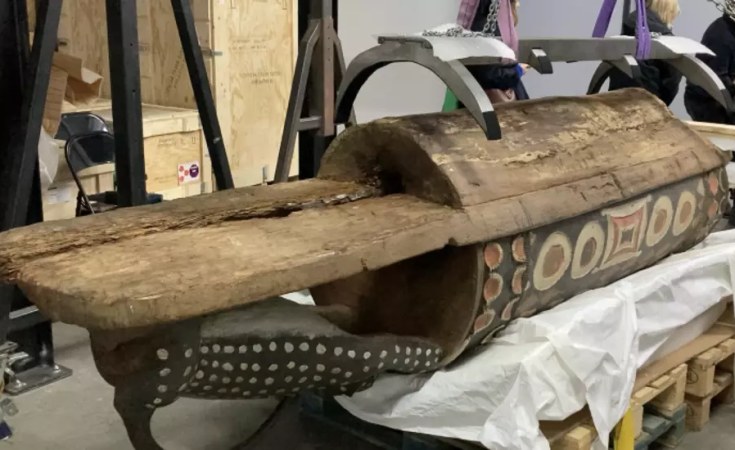Restoration works on the Djidji Ayôkwé, or "talking drum", have now been completed in Paris. The artefact, stored at the Quai Branly museum, is ready to be returned to Côte d'Ivoire under a restitution plan promised by President Emmanuel Macron.
The legendary drum, which once belonged to the Ebrié people, (previously known as the Tchamans), was seized by French colonial settlers in 1916.
It had been used to warn of dangers, mobilise for war or summon people for ceremonies or gatherings and could be heard from some 12 kilometres away.
Originally housed in the village of Adjamé, the Djidji Ayôkwé was used to communicate to the seven surrounding Tchaman villages.
"It was a means of communication ... If the settlers took it, it was a way of gaining control over the tchaman group," Clavaire Mobio Aguego, currently the holder of traditional authority in Adjamé told RFI's Abidjan correspondent, Pierre Pinto.
The special object, measuring 3.31 metres long and weighing 430 kilograms, has been the focus of restoration efforts for the past month in a workshop on the outskirts of Paris.
The drum had been eaten away in some places by insects.
The consolidation work was undertaken using a resin "injected inside the weakest areas", allowing the wood to "regain a certain density and solidity", Nathalie Richard explained to RFI's Pierre Firtion earlier this week.
In charge of the conservation-restoration centre at the Quai Branly Museum in Paris, Richard says she is very satisfied with the final result.
Special resin
"We used a resin capable of going deep inside the wood, but which should not shine, saturate or darken the colour. As such, we can say that the treatment is a success: the solidity has been recovered at certain levels and the appearance has not been modified," she says.
She also insists that the acoustic capacity of the drum, one of the primary concerns in Côte d'Ivoire, was in no way altered.
"It was the Djidji Ayôkwé that allowed the villagers to warn each other that the settler was arriving, because people did not agree with the forceful method of requisitioning people to go work," Silvie Memel-Kassi , the director of the Museum of Civilisations of Côte d'Ivoire told RFI.
"When they [the settlers] came, they couldn't find anyone and they ended up realising that it was because of the drum beating, heard from very far away".
Memel-Kassi visited Paris in November 2021 before the restoration began and was happy the see that the drum was in reasonable condition, despite its age and poor conservation.
Preparation for transport
The Djidji Ayôkwé will now be placed on a base which will take around a week to make.
"The idea is to preserve the object as much as possible during handling," says Nathalie Richard, explaining that a special "cradle-like" frame will be built to allow the drum to remain aligned.
"This large base will be fixed on a platform that will allow the object to be handled without having to transfer it to temporary platforms each time we want to move it".
The drum will then be placed in a specially built box for its journey home.
At the end of 2018, Côte d'Ivoire had officially requested the restitution of nearly 150 works.
Macron announced at the Africa-France summit on 8 October, 2021 that the drum would soon be returned to Abidjan, but a date has not yet been settled.
A specific law will need to be passed by the French parliament, similar to the one that allowed numerous works, confiscated in colonial times, to be returned to Benin and Senegal in November 2021.
The traditional Tchaman chiefdom has welcomed France's gesture and is waiting for the drum's return to Abidjan where a welcome ceremony will be held.
It will be a great opportunity for the public to inspect the Djidji Ayôkwé up close, as it has only ever been talked about or seen in pictures, insists Clavaire Mobio Aguego.
The Ivorian authorities have already reserved a place for it in the National Museum, located in Plateau, on the former lands of the village of Adjamé.


